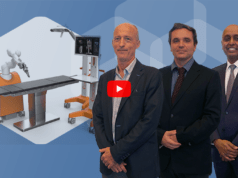
Treating patients with metastatic bone disease by radiofrequency ablation (RFA) using the OsteoCool system (Medtronic) results in rapid and statistically significant improvement in pain scores, and provides sustained, long-term relief. Attendees of the 2021 meeting of the Society of Interventional Radiology (SIR; 20–26 March, online) will be the first to hear the full cohort data from the Medtronic-sponsored OPuS One post-market clinical study in the “Abstract of the year” presentation, to be delivered by Jason Levy (Northside Hospital, Atlanta, USA) to the virtual audience. This latest dataset follows previous announcements from the OPuS One team also detailing positive results following RFA with the OsteoCool system.
OPuS One is the largest clinical study—with the most meaningful clinical results—considering the OsteoCool technology to date. Principal investigator Sandeep Bagla (Vascular Institute of Virginia, Woodbridge, USA), along with Levy and other colleagues, set out to assess the effectiveness of the OsteoCool RF ablation system. They conducted a global, prospective, nonrandomised, multicentre study of RFA for the palliative treatment of patients with painful osseous metastases.
In addition to pain, osseous metastases can cause fractures and some “pretty debilitating symptoms”, such as spinal cord or neurovascular compression, Levy said.
He continued: “Radiation treatments have been commonly used for this, but they do not always provide pain relief, they can take weeks to occur, and they can set a patient up for fractures down the road. When the effects of their treatment are delayed for weeks, in this population of palliative care patients, that may consist of a significant proportion of that patient’s life.”
The investigators therefore wanted to ascertain the ability of RFA to provide quick and long-lasting pain relief for these patients.
Opining on their results, Levy enthuses: “We are really excited by what we saw. The first thing we noticed is that we had pain relief as fast as three days, which is obviously very significant in this patient population, especially when the standard-of-care treatment right now, radiation, takes four to six weeks.
“In addition, this was sustained. At one year, the majority of patients continued to report pain improvements, which is also a significant improvement over radiation treatment.”
Patients also experienced significant improvement in average pain, pain interference, and quality of life.
“I think the most important outcome from this study is that RFA can give patients a very rapid, improved quality of life within three days, and this is sustained out to 12-months,” Levy reiterated. As the OPuS One trial largely focused on lytic metastases, which are very common, Levy says these results demonstrate that RFA with OsteoCool is a “good option” for a wide range of cancer patients.
“I believe this treatment should be available in the patient paradigm than what we saw in this study, where it was mostly a palliative treatment,” he concluded. “[We should offer it to] more patients where we can prevent future fractures, and prevent pain from lasting a long time.”
Levy and Bagla spoke to Interventional News following the results of the first 100 patients treated in the OPuS One clinical study. The full interview can be viewed here, or below.













